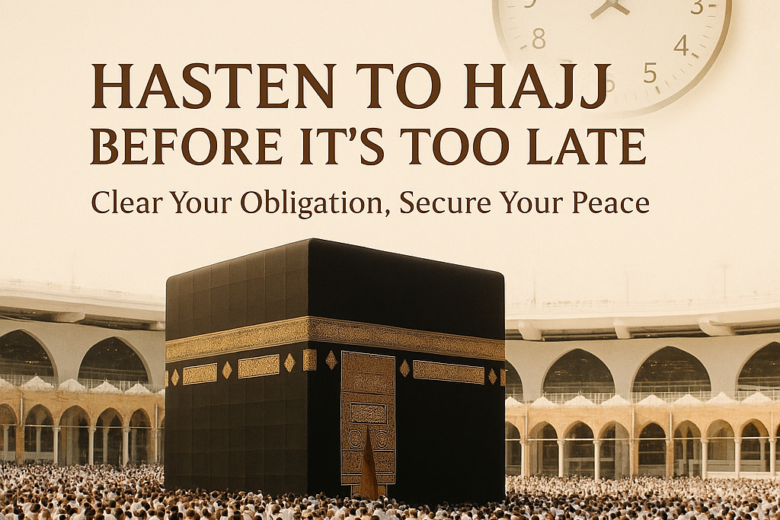🎯 Question:
What is the ruling on a person who has physical ability and financial capability but does not perform the obligatory pilgrimage (Hajj)?
🔹➖🔹➖🔹➖🔹➖🔹➖🔹
📌 Answer from the Esteemed Shaykh:
In the Name of Allah, and peace and blessings be upon the Messenger of Allah.
The scholars have differed regarding the timing of the obligation of Hajj:
🔸 Opinion 1: Obligation of Immediate Fulfillment (الفورية):
- Some scholars argue that performing Hajj becomes immediately obligatory upon attaining physical and financial capability. They support this opinion with various hadiths, such as:
- “تعجَّلوا إلى الحج فإن أحدكم لا يدري ما يعرض له”
(“Hasten to perform Hajj, for none of you knows what may occur to him.”) - Another hadith states:
- “قد يمرض الصحيح وتضل الراحلة…”
(“The healthy person might become ill, and the riding animal may get lost…”), indicating the unpredictable changes in life:- The healthy may become sick.
- The young will age.
- The living may suddenly die.
- “تعجَّلوا إلى الحج فإن أحدكم لا يدري ما يعرض له”
Thus, it’s preferable for a Muslim to clear their responsibility immediately upon having the capability and no barriers to perform Hajj.
🔸 Opinion 2: Obligation Can Be Delayed (على التراخي):
- Another group argues that these hadiths encourage hastening but do not necessarily indicate immediate obligation (فرضية الفورية). They cite evidence such as:
- Allah’s commands in the Qur’an:
- {فَاسْتَبِقُوا الْخَيْرَاتِ}
(“Race towards good deeds.”) - {وَسَارِعُوا إِلَى مَغْفِرَةٍ مِنْ رَبِّكُمْ}
(“Hasten towards forgiveness from your Lord.”)
- {فَاسْتَبِقُوا الْخَيْرَاتِ}
- Allah’s commands in the Qur’an:
- They also highlight that the Prophet Muhammad (صلى الله عليه وسلم) himself performed Hajj in the 10th year after Hijrah, despite its obligation from the 6th year onwards, after the Treaty of Hudaybiyah. Prior to the conquest of Makkah, the Prophet (صلى الله عليه وسلم) did not perform Hajj, indicating permissibility of delaying.
🔹➖🔹➖🔹➖🔹➖🔹➖🔹
🚨 Responsibility and Accountability:
- Those who adopt the second view (allowing delay) emphasize:
- If a person has the opportunity and capability but delays or procrastinates, and subsequently loses that opportunity (e.g., wealth is lost, health deteriorates), they become responsible and sinful due to negligence.
🔹➖🔹➖🔹➖🔹➖🔹➖🔹
🌟 Imam al-Ghazali’s Insight:
- Imam al-Ghazali (رحمه الله) beautifully expresses in his book Iḥyā’ ʿUlūm al-Dīn that Hajj symbolizes the completion of religious obligations and the closure of one’s life journey.
🔹➖🔹➖🔹➖🔹➖🔹➖🔹
🌿 Historical & Contemporary Context:
- In the past, Muslims often concluded their lives by performing Hajj.
- Nowadays, due to the Islamic awakening (الصحوة الإسلامية), pilgrimage seasons (Hajj and Umrah), particularly during Ramadan, witness a significant presence of young men and women, indicating a blessed revival and hopeful future for the Ummah.
🔹➖🔹➖🔹➖🔹➖🔹➖🔹
🥇 Final Recommendation:
It is preferable to hasten and perform Hajj immediately once one is physically and financially capable, as:
- No one can guarantee continuous health or life.
- Potential unforeseen obstacles may emerge.
Thus, hastening toward good deeds is wiser and safer, relieving one of religious duty and providing spiritual peace.

